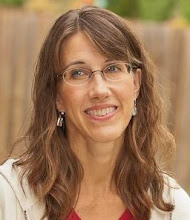Jen in Seattle asked these very thought-provoking questions:
How have you encouraged your children’s hearts toward the Lord? How have you responded when they've resisted spiritual things? How do you help them through questions of theodicy [defense of God's goodness and justice in the face of the existence of evil]?
I’m sure that the most important way we encourage our children's hearts toward the Lord is by our own example. They see us reading our Bibles and serving at church, of course--but even more importantly, our kids hear us pray, out loud, honestly and openly. They hear us confess, with tears, our failings and our need of God's forgiveness. They hear us seeking His wisdom when we have none. They hear us ask for His help with tasks that are too difficult for us. They hear us intercede for sick and hurting friends--and when they are sick or hurting, we lay hands on them and pray for them. They see us praising God for His blessings.
We encourage them to pray aloud in the same way—honestly asking for help with their needs and struggles. We expect them not just to pray for sick friends and their own material desires, but to ask God for the spiritual transformations they need—to pray for patience, or diligence, or love for a difficult person. We discuss Scripture with them and encourage them to respond to it in their prayers.
I believe that creating this environment of spiritual honesty has probably been one of the best things we have done with our kids. It’s encouraged a family culture of open communication which is paying off as our kids reach teenager status.
I think a key point too, is that our kids are with us all the time, since we homeschool. I have many opportunities every day to affirm right attitudes and correct wrong ones, to ask the questions that make them think about what comes out of their hearts through their mouths. And our kids are not spending large portions of their day in an environment which is Godless, but in a family, where He is the center. We noticed a big difference when our oldest son was in public school, especially during middle school—he was more apt to say things like he didn’t care what God thought, or to tell us that things like swearing didn’t matter. He was definitely affected by being away from our influence so much. He has seemed happier, more relaxed and pleasant since he’s not been going to school this year, and has even given big-brotherly advice to Bantam9, who’s currently doing a stint in public school, on traps to avoid (including swearing!).
As our kids have reached that age when they start to question it all--Does God really exist? Are the Bible stories really true? How can God let bad things happen to people?--we have continued to model a transparent honesty. We admit that we don't have all the answers. We know God uses suffering for good in our lives, if we choose to respond in the right way to trials--yet it is hard to watch others suffer, or to understand God's purpose in it. Our knowledge is limited, yet His is not. My favorite analogy to use with kids (and myself) is the jigsaw puzzle--so often all we are holding is a piece or two, but God sees how each one of the 1,000 pieces fit together.
As for God's existence, we believe He exists because we know Him. He speaks to us, acts in our lives, we can feel His presence--and they admit that they know Him too, in that way. I've told my older kids that in college I studied all the rational arguments "proving" the existence of God, but the bottom line for me has been--what kind of a life do I want to live? A life with God, as a Christian, or a life without Him? Not only do I prefer a life on this earth with God vs. one without Him, but on a purely pragmatic rational basis, I have a lot more to lose if I don't believe in God and am wrong, than if I do believe in God and am wrong. That was Pascal’s position, and for the child who was voicing these doubts, it was a convincing enough thought--though he was also sobered by the specter of a life without Him.
And that friends, wraps up the birthday questions for another year! Thanks so much to all who participated and asked such great questions. It was fun to think them through!
Subscribe to:
Post Comments (Atom)

3 comments:
Phew! Brava. I'll be having to link back to this one ("I'll be having"...that's Southern talk for "I will have to" or "I will", "I must")
Thanks for this, my friend. You have challenged me to think deeply about discipling our children.
Another thought for you . . . do you have any stitchers at your house (cross-stitchers, embroiders)? Another excellent analogy (along the lines of the jigsaw puzzle) is from Maria Von Trapp (yes, that Maria Von Trapp). I'm looking for the exact quote and can't find it, but the idea is that life is like a tapestry. Today, we see only the reverse side of the weaving, with its threads running wildly here and there. God, however, has planned the front side of the tapestry and it is beautiful. And, she says, "Someday, we shall understand" when we see the front side of the weaving. For someone who is familiar with needlework, this has such meaning to me.
Thanks so much for your thoughts!! This is such a wide subject :-)
Jen in Seattle
Post a Comment